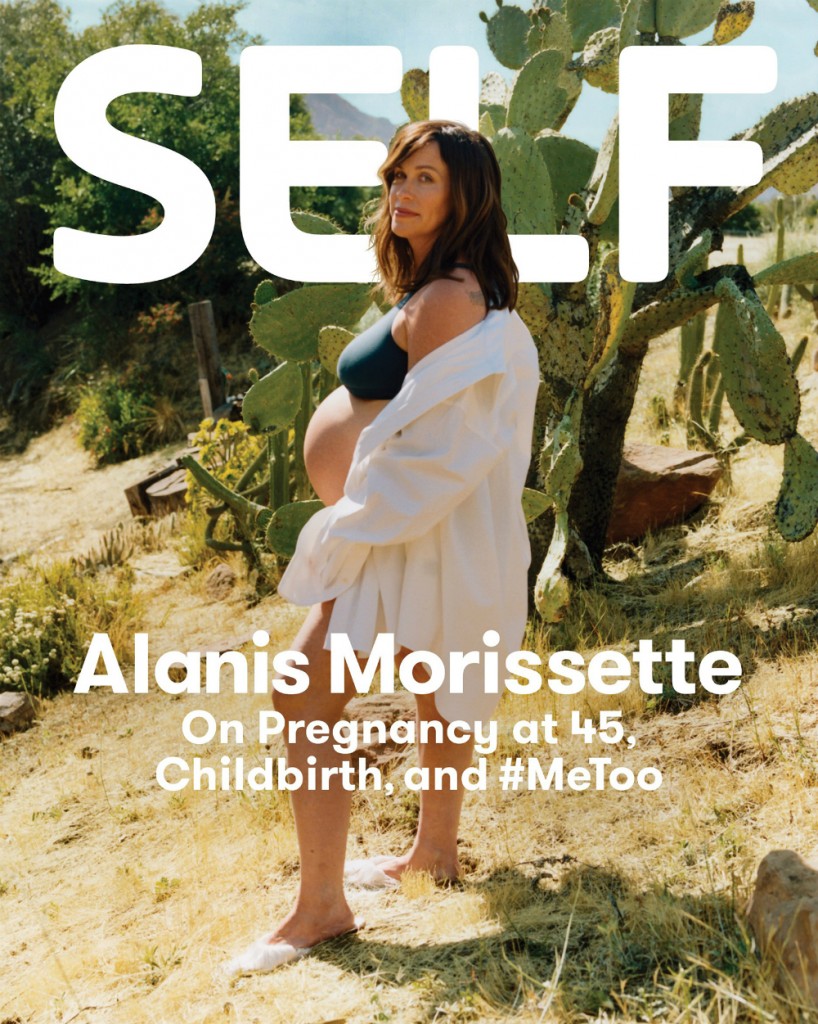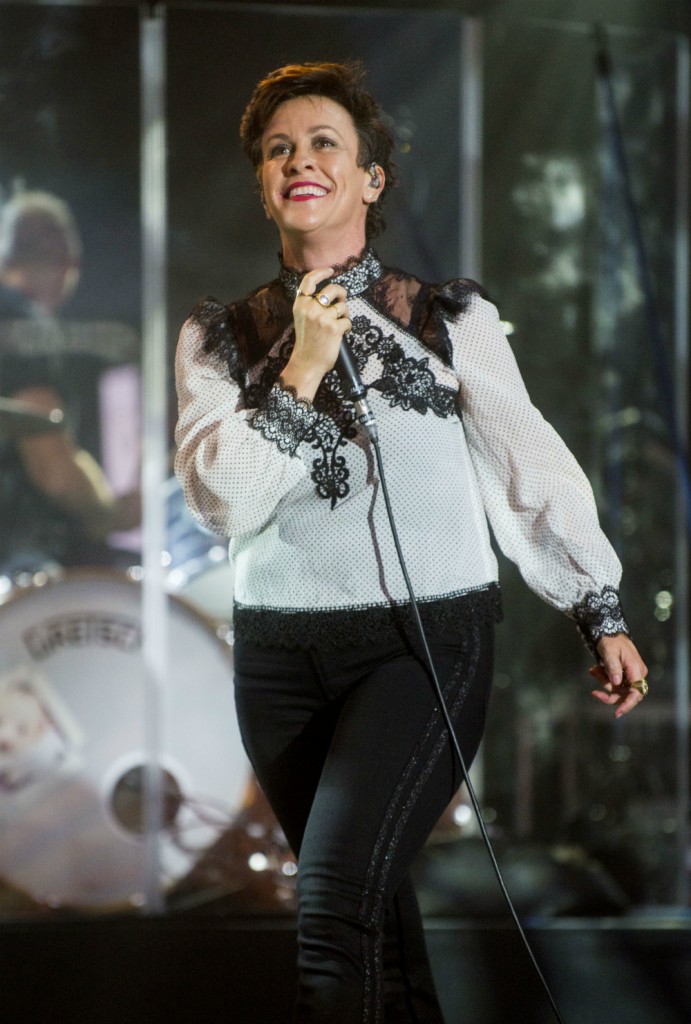Alanis Morissette was interviewed by Nicole Cliffe for Self Magazine. I don’t know what I expected going into it, but I needed a moment to process it once I’d finished. The majority of the interview is about pregnancy, giving birth and post-birth mental health. I found it fascinating. I’m a little odd in that I love detailed giving birth stories, but I recognize that may be unique to me, so I want to focus on how Alanis is preparing for the possibility of postpartum depression with her third child. Alanis is 45 years old. She has two children, Ever, eight, and Onyx, two. She experienced PPD with both of her first two children but waited to reach out to anybody for help because she felt she thought she just needed to “muscle-through,” which is how she’d treated her depression throughout her life. And although she didn’t wait quite as long the second time, she still waited. But not for this child, Alanis said she has already prepared her friends and family for any PPD she may experience.
Alanis has previously been open about her experiences with postpartum depression, but I wanted to really get at not just the two bouts she had already fought, but also her plan for tackling it when she gives birth again in a few months.
“Not singularly relying on myself to diagnose myself is key,” she said. “Because the first time around I waited.”
And she did. She waited a long time. She waited because her entire life had prepared her to muscle through and remain superhigh functioning while grappling with a new kind of depression that wasn’t the on-and-off depression she’s been processing much of her life.
For Alanis, it manifested as a familiar heaviness. “For me I would just wake up and feel like I was covered in tar and it wasn’t the first time I’d experienced depression so I just thought Oh, well, this feels familiar, I’m depressed, I think,” she said. “And then simultaneously, my personal history of depression where it was so normalized for me to be in the quicksand, as I call it, or in the tar. It does feel like tar, like everything feels heavy.”
“Often what had pulled me out of my depression pre-family was service,” she said. Service, for Alanis, is performing and feeling connection with her audience (when we later e-mailed her to clarify, she said, “Service for me has been through my songs…offering comfort, empathy, validation, support, information, assurance […] with an eye toward healing and a return to wholeness”). “So I would just think, Oh I’m just going to go out into the world and serve and then I’m going to feel better, but that didn’t do it. And then I had my various forms of self-medicating [that also didn’t help]. So, creativity’s not doing it, tequila’s not doing it…and I even sang about it.”
Alanis muscled through for a year and four months that first time, before reaching out to a doctor and asking “if I stick this out, will it get better?” Hearing “no, honey, the opposite” was enough to unlock her.
“The second time, though, you still waited,” I said. “How long?”
“Four months. I know!” Alanis said. “And now this time I’m going to wait four minutes. I have said to my friends, I want you to not necessarily go by the words I’m saying and as best as I can, I’ll try to be honest, but I can’t personally rely on the degree of honesty if I reference the last two experiences. I snowed a lot of them as I was snowing myself [the last two times].” This time, she’s lined up seven people to watch and wait and push through her demurrals and distractions, including her physician and midwife.
Alanis said in the article that she is a planner and gathers information constantly. Given what I learned about her from this interview, this sounds like a really good plan to combat any potential PPD. It’s a plan many people, especially people who feel guilty for burdening othera, would benefit from. Educating those you trust on signs to look for helps them to support you when you need it. I promise you, they want to do just that. It sounds like Alanis is doing everything she can. She said she’d always wanted three kids and I’m glad she did not let anything get in the way of that.
Alanis has an her openness and understanding of herself which was brought out in this interview by Nicole’s insight. One part I really appreciated, as did Nicole, was when Alanis discussed her “four boundaries,” which serve as her cornerstones in life. She said, “I talk about this with my kids a lot, the four boundaries being: You can’t tell me what I’m thinking, you can’t tell me what I’m feeling, you can’t f–king touch my body/you can’t do anything with my body, and don’t touch my stuff.” As the interview details. Alanis has had a long, and sometimes fraught, journey to establish those four boundaries. I’m so happy she’s found such peace in her world. Congratulations to her and her family on this next chapter.
Photo credit: Self Magazine, Instagram and WENN Photos













Best wishes to her! She may avoid PPD this time and I hope she does.
I had PPA with my first child. I have an anxiety disorder so I recognized what was happening and was in therapy within two months. It was very well helped with therapy.
With my second child I was prepared and ready to do the work again, if I had PPA again. But I didn’t have it! I was amazed. I even had a scary incident with my second child very early on (a breath holding incident, I had never encountered that before and it was so scary, we called 911!). And so I was sure symptoms would start but they didn’t.
I hope she can be fortunate enough to avoid it a third time. But if not, how amazing that she’s so prepared. This kind of sharing is helpful to many women, who can also think to prepare a support team and know that whatever happens, it’s a roll of the dice each time and it’s never a woman’s fault and never something she should have to face alone.
Her four boundaries are something I may have to adopt for myself – I love Alanis, Jagged Little Pill was always on repeat anytime I got my heart broken!
I love these, too. If I ever have children, I want to instill them with these, as well. It’s a very healthy way to view your rights/needs as an individual.
She seems like a great mom. I hope this birth goes well for her.
Oh, that album… My nine-year-old daughter begged and kept on begging me to buy it for her. I finally relented. It was also on repeat in our house. I loved it, too, but it was a very sad time for the three kids and me, as their dad had died only recently. Any time we hear a track from the album, we tear up and usually have to turn it off.
Alanis looks wonderful.
It’s great she’s talking about this. I dealt with depression and anxiety attacks in my 20’s and anxiety during both of my pregnancies. When you’ve dealt with depression in the past, you have a higher chance of postpartum depression. While pregnant with my first, I prepped my husband, Mom, Doctor, and close friends to be on the lookout for my mental health. It took the burden off me knowing my community was aware and ready to help if I needed it. I ended up not having PPD, thank goodness, and I wonder if being so open and talking about the possibility with others was a positive preventative measure somehow.
I’ve heard so many stories of PPD and people not reaching out and thinking it would just go away on it’s own, that I was worried what I would do because I’m the type to keep silent. So with each of my 3 pregnancies, I would speak to my parents and my husband and tell them that they knew me and how I respond and act to every day occurrences and if they every feel like I’m not being myself to speak up and let me know because while I might think something is different, I probably wouldn’t reach out for help. I was lucky that I didn’t have PPD, but I did have my people looking out for me for this very reason.
After I had my first baby I became anxious, very worried all the time, then I immediately fell pregnant again and I felt a little relief. After my second baby was born less than 11 months after the first I became crazy with anxiety. It was as if I were waiting for the shoe to drop every second of the day. I would fly off the handle if things weren’t done a certain way, because I was constantly thinking of the babies health. Or I would wake up several times a night to obsessively check on them. I finally told my OBGYN what I was feeling and imagine my surprise when he said it was PPD. He said it can manifest many ways and ocd/ anxiety is one of them. He put me on Wellbutrin and it was a life changer.
So don’t dismiss ppd just because you aren’t crying or sad bc it can still be there.
Oh wow, I thought post partum anxiety was a separate thing. Didn’t realize it was all under the umbrella of PPD. I had PPA too, but didn’t realize it until after I stopped breastfeeding and my hormones went back to pre-baby normal and I was like “oh, this crazy state I’ve been in wasn’t permanent after all, phew!”
I LOVE birth stories. I watch a lot of labor & delivery stories on YouTube. I find them so interesting. I read the interview yesterday and it was such a well written piece. Nicole Cliffe did a great job. And yes the part about the four boundaries really stood out because like Nicole Cliffe said – that’s pretty much the key to everything. Emotional and physical boundaries and everything else flows from that. This interview reminded me why I was so obsessed with Alanis when I was a teenager.
wish her all the luck!
one of my faves love her.
The part that really struck me is the song Hands Clean and how it anticipated MeToo by 15 years. I remembered that song as a good, fast tempo song about getting over a bf who was a creep. But yesterday I listened to it again, with the perspective of MeToo, and wow, that song has some scorching lines in it. “I honored your respect for silence” and “supposed crime”.
It’s telling how that whole song was glossed over when it first came out. If it had come out today, it would get a completely different reaction.
Wow, yikes, I haven’t listened to that song since MeToo, and you’re completely right.
The four boundaries are so, so good.
They really are and I love that she is teaching them for her kids. They will learn to respect others and insist that others respect their own boundaries.
Aw, I will always love her. She’s a good egg. PPD sounds awful. I don’t have kids, but I do have anxiety and depression. I can’t imagine having to care for a newborn to boot! I am so glad women are able to discuss openly and don’t have to suffer in silence.